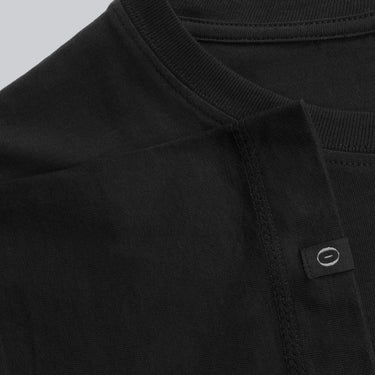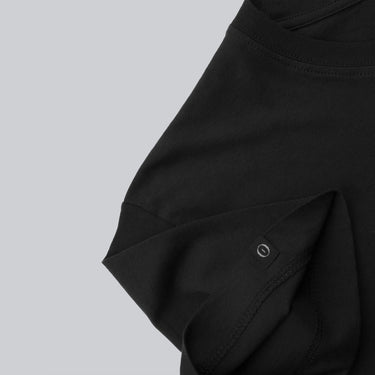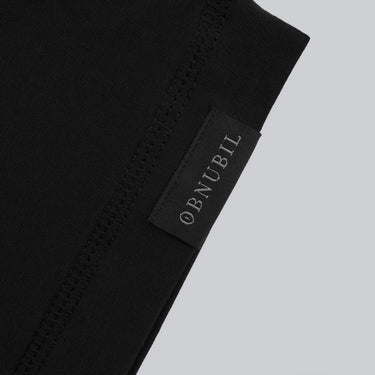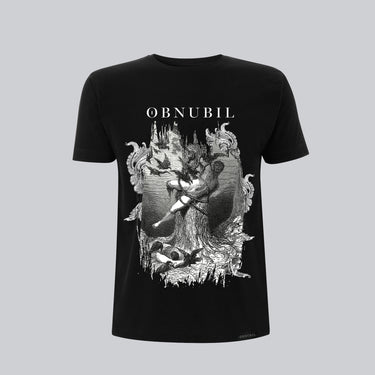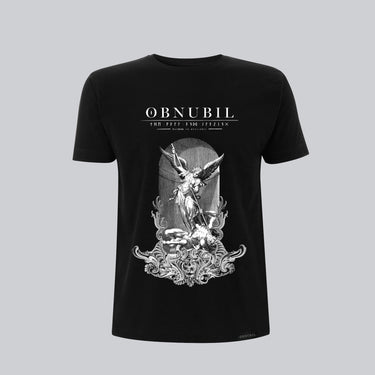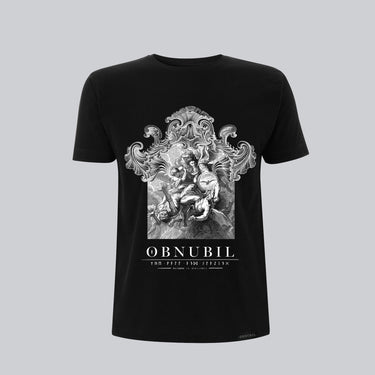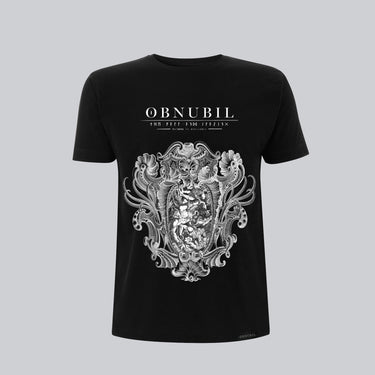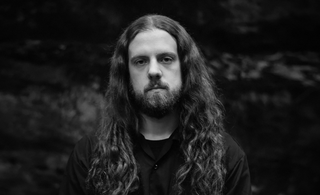
In this in-depth conversation, Obnubil Magazine sits down with Brody Uttley, the visionary guitarist of Rivers of Nihil, to trace his journey from humble beginnings to pushing the boundaries of modern metal. Through tales of early inspiration, grueling tours, and creative awakening, Brody reveals how he’s continually reshaped his musical identity—balancing technical mastery with emotional storytelling. He opens up about the trials behind the scenes, the turning points that defined each record, and where he’s heading next. Whether you're a longtime fan or someone curious about how musicians evolve, this interview offers a rare glimpse behind the curtain of a band that refuses to stay static.

INTERVIEW
OBNUBIL: Brody, thanks so much for taking the time—it’s a real pleasure to speak with you. Before we dive into your journey as a guitarist, I’d love to start on a more personal note: how are you feeling after such a packed run of performances? Did any of the recent shows—whether the big festival highlights or the more intimate club dates—leave a lasting mark on you or spark a new sense of creative energy going forward?
Brody: I’m doing well. I have fully recovered from the jet lag at this point and I am dialed back into normal life. This was our second time doing the August festival circuit across the EU and UK so we were a little more familiar with what to expect. Overall it was a great time. The shows were all amazing and we got to see some new places. Playing in Romania and Serbia for the first time were personal highlights for me. I would say specifically the show in Belgrade left a big impression on me. We played in the courtyard of this student center that has been having shows since the 1950s. The sun was down and there were about 600 people all giving us such massive energy. Totally unexpected for our first time in the country. The green lighting reflected off of the massive buildings that surrounded us in such a cool way. It just felt like a very cool moment that I will remember always.
OBNUBIL: Every guitarist has that origin story moment—sometimes it’s the first time a riff knocks you off your feet, sometimes it’s just the sheer fascination of holding six strings and realizing you can create sound. Can you take us back to the very beginning of your journey with the guitar? Was it your first love, or did you stumble onto it almost by accident? Do you remember the first time you felt those notes resonate in your body and thought, “This is it for me”? Which players or albums made you want to pick it up in the first place, and when do you think you started breaking free from imitation to actually finding your own voice on the instrument?
Brody: My father was a huge music fan and record collector. Music always filled the house and was just immediately part of my life as far back as I can remember. The earliest memory that I have of the guitar is definitely my dad playing the acoustic guitar around the house. Funny story, I actually ended up sitting on that guitar and smashing it when I was really little. Anyway, even though my dad was one of my earliest memories of guitar, it wasn't until he showed me an old live performance of Iron Butterfly playing the extended version of “In-A-Gadda-Da-Vida” that I became extremely intrigued by the electric guitar. The guitar player in the video had long silky hair, cool looking clothing, and a bright red sparkling guitar that he was using to make some of the craziest sounds that I had ever heard. He was using his whammy bar to make these “elephant sounds” as my dad would call them. I thought it was so cool. Shortly after that my dad got me my own acoustic guitar but I found it frustrating to play at the age of 7. It wasn't until I was about 12 that I would pick up the guitar again. I remember getting into Eric Clapton’s playing on the Cream albums around that time. Songs like “White Room” and “Tales of Brave Ulysses” were on constant rotation in my Sony Discman on the bus to school. Hearing him playing all of those awesome blues licks with a wah wah pedal just blew my mind. It was around that time that I saved up enough money to buy my own electric guitar and really start diving into the instrument. Eric Clapton, Jimmy Page, Stevie Ray Vaughan, Steve Vai, Zakk Wylde, and David Gilmour were all very big influences on me in my early days of guitar. I can’t really say when I found my voice. I suppose I'm still looking for it, but I guess in 2015 when I wrote our second album, Monarchy, I really dove deep into my creative pool and came back out with the first body of work that I would consider to be unique to me at the time.
Quick-fire interlude: – If you could magically swap right hands with any guitarist for one day, just to steal their picking attack, whose hand are you taking?
Brody: Easy answer. Vogg from Decapitated.
OBNUBIL: When Rivers of Nihil started, you were young, ambitious, and operating in a very competitive genre where technical skill was often the first thing people noticed. Looking back at those early days—playing local shows, trying to stand out—what were the hardest lessons you learned about being in a band that no one could have prepared you for?
Brody: I suppose when you’re a kid you sort of visualize being in a band and going on tour as this magical wanderlust thing where you’re just having the best times at all times with your best friends. It can be like that at times, but nothing can really prepare you for the doldrums of the road. Being on 6 week long tours where hardly anyone shows up and nobody makes any money. Having to drive 12 hours overnight and your van breaks down. Dealing with the personalities of everyone in your band when everyone is cranky and tired and broke and hungry and hungover. Having relationships fall apart at home while you’re out on tour. Getting into your own head about the point of all of this and just generally feeling like somewhat of a failure as a person when you see people your age getting married, having children, and buying houses while you sleep in the parking lot of a Wal Mart with 5 drunk men all farting in your face. Getting robbed. All of this stuff can literally make you go crazy and want to quit, and many people do. Everything takes a lot longer than you think it's going to take. I remember playing local shows in 2010 and thinking “yep, just a few more shows like this and we are gonna get signed and be able to quit our jobs!” The reality is that I didn’t make a single dime from this band until 2017. We basically toured at a loss from 2010-2017. Playing music as a career is definitely a long game. You have to be able to dodge a million obstacles and still continue to push forward. None of this is anything like what I expected, not in a bad way, it's just nothing I could have ever imagined without experiencing it. I’m glad I did. I’ve experienced a lot of stuff that most people will only see in films.
OBNUBIL: Every guitarist has a formative “trial by fire” moment on stage. For you, was there one early gig or tour experience that tested you so hard you thought: “If I survive this, I can handle anything”?
Brody: It's hard to say. I feel like there have been so many of those, even to this day. However, I do remember in 2010 we got asked to play at our first out-of-state show. It was a metal festival in Milwaukee, WI called “Midwest Fuckfest”. We ended up buying our first van to get to that show. I remember packing the 5 of us and two of our friends into that old crappy van along with ALL of our gear. It was our first real experience hitting the road together. None of us really slept and it was extremely uncomfortable. When we got to the show our bass player’s amp fell over and broke mid-set. I think we ended up getting paid $40. The drive home was nearly 12 hours. While it wasn’t necessarily a traumatic experience or anything I do remember coming home from that feeling changed. Like I was sort of on a new path with a new sense of confidence knowing that we successfully pulled off a weekend on the road.
Quick-fire interlude: – Have you ever written a riff so physically awkward that you thought, “This is cool, but I’m punishing myself every night on tour”?
Brody: Oh all the time. Currently regretting writing the guitar solo in “Evidence” from our new album. That solo is so hard and has to be played so precisely so as not to sound bad. Looking forward to punishing myself every night on the next tour.

OBNUBIL: As the band gained recognition, Rivers of Nihil’s sound started evolving beyond pure technical death metal into something far more expansive and atmospheric. From your perspective, how much of that growth was a conscious decision—wanting to push boundaries—and how much simply reflected your own evolution as a person and as a guitarist? Was there a specific personal experience that cracked something open musically for you?
Brody: I think our entire discography has really just been the sound of us all growing up and changing as people and creatives. Some of us were 18 when we wrote the songs that ended up on our first album. As we have gotten older we have all gotten into a lot of different kinds of music. I think it's natural for those new influences to work their way into what we write. I remember a big shift around 2016-17 when I was writing the music for Where Owls Know My Name. Up until that point our sound was pretty exclusively technical death metal. I remember experimenting with a lot of new sounds in my home studio during the Owls sessions. Just really taking all restrictions off of what I would normally allow for this band. I think before then I was boxing Rivers of Nihil into this “death metal” category where I was afraid of what our fans would think if we ventured too far outside of that style. I don’t think pushing boundaries was an active goal at that time at all. I think it was just a period of pure creativity where I felt like anything was possible and I didn’t really care about what anyone thought. Luckily they did end up liking it a lot. I was also learning a lot about recording at the time, so I think that the barrier between something that I heard in my head, and translating it to a recording session was finally very low. I felt like I could instantly articulate any idea that I had.
Quick-fire interlude: – Do you think of your guitar more like a drum (rhythmic tool) or a synth (sound design tool)?
Brody: It really depends on the part. On songs like American Death I would see the guitar as more of a percussive element, unlike a song such as Water & Time where sometimes it's hard to distinguish the guitar from the synthesizers. It just really depends. I enjoy both.
OBNUBIL: Touring became a huge part of your life once the band took off. Long hours, exhaustion, constant travel—it’s a world that changes people. How did years on the road specifically reshape your relationship with the guitar? Did it alter the way you write, the way you play, or even the way you think about what makes a song work live?
Brody: While I still do love the guitar, I think that after years of touring and making records I view it more as a tool, and less as something that I can do to wind down or have fun in my free time. It sounds awful describing it like that, but all I mean is that whenever I pick up the guitar now it's usually to either write new material or get better at playing material for an upcoming tour. I don’t really sit down and pluck around for fun anymore, nor do I learn other people’s music. My focus on the instrument has narrowed greatly in the last 10 years to basically exclusively being about Rivers of Nihil. My goal is to be the very best Rivers of Nihil guitarist and songwriter that I can be. I want to be able to level up our songwriting on every new album, and be able to execute those songs in a live environment as accurately as possible. I think playing live for so long has definitely informed my playing and writing. Early on I would write a lot of stuff that was just insanely fast and not really designed to sound good in a room full of people. These days I really focus on dynamics and picking tempos that are going to allow songs to bloom in a concert hall and translate well live. We still do the fast stuff obviously, but I'm more methodical with how we do it. This is something that I could have only learned through playing live and realizing that some stuff just doesn’t sound as good live as it does in a controlled studio environment.
OBNUBIL: Bands often have transitional albums where the musicians themselves feel like they went through a personal metamorphosis while making it. For you personally, which Rivers of Nihil album do you feel changed you the most as a guitarist? Not just in terms of skill, but in terms of how you thought about creativity, your role in the band, or even your identity as a musician?
Brody: Tricky one. Kind of a three part answer. I think that when I wrote our second album, Monarchy, I really began to take on my role in the band as the primary songwriter. Just before that album our original second guitarist quit the band, so most of the songwriting fell directly on me. I think on Monarchy I was able to prove to myself that I could write an album. I think on Where Owls Know My Name I leveled up as a guitarist is a major way. I really worked on a lot of technique stuff leading up to that record. If you listen to the solos (and just the guitar playing in general) on Monarchy vs. Owls you can hear such a huge difference. I think Owls was also where I really started to get good at structuring songs. Our fourth album, The Work, is still what I consider to be the most massively productive and creatively pure time in my life as a musician. I sat with those songs for so long and refined them beyond the point of insanity. I blended genres and soundscapes, and used recording techniques that I never would have imagined in the early days of this band. I feel like that record could have only been made during Covid. 2020-21 gave me so much time to reflect on myself as a person and just on music in general, and it all came out in those songs. I know in my old age I will look back on that record and still be very proud of it, no matter what other people think.
Quick-fire interlude: – If you had to build an entire song around just one pedal, which one would it be and why?
Brody: Probably a delay pedal. So much of what Rivers of Nihil’s sound has become is based around atmosphere and mood. I use delay on pretty much everything. It always feels like it takes you to a different place. Probably why I like it.
OBNUBIL: A lot of tech death guitarists treat riffs almost like athletic exercises—clean, mechanical, precise—but your approach often leans toward atmosphere, emotion, and narrative. Was there a turning point in your journey where you realized that emotion needed to come first, and technique should just serve that?
Brody: I started to realize this during the Monarchy album. Songs like Hierless, Suntold, and Terrestria II all favor atmosphere and emotion over technicality. That style carried over to Owls and really started to take shape on songs like Where Owls Know My Name and Capricorn/Agoratopia. I think The Work was when the technicality was at an all time low in favor of big, moody, crushing passages that transported you to a different place. I’ve always been a big fan of post rock and post metal bands. Groups like Sigur Ros, Russian Circles, This Will Destroy You, Explosions in the Sky, etc. all taught me how important cultivating a vibe is for a song. They also really turned my ear onto using reverb and delay as tools to create massive walls of sound. I love music that makes you feel like you’re floating in the ocean or ascending into the clouds, so I always try to include that energy in what I write. We obviously still have technical playing, I just think it's used as more of an extra gear when needed rather than a normal cruising speed. Creating peaks and valleys in music is so important to me, and you can’t really do that if you’re going 100,000 miles per hour at all times.

OBNUBIL: Growing up in Pennsylvania, you were somewhat removed from the big coastal metal hubs. Do you feel like that sense of distance from a “main scene” influenced your creative voice in a way—maybe forced you to look inward more, or carve out something unique instead of just emulating what was trendy? And when you look back now, do you see your regional background as a challenge you had to overcome, or as a secret ingredient that made your sound distinct?
Brody: I don’t really know if us being removed from the main hubs had anything to do with what we ended up sounding like or not. I had my group of friends in the area and we all liked a wide variety of music. Luckily the internet was really starting to take off when I was around age 14-15 so talking to friends and sharing music and ideas was still pretty easy even though I wasn’t living in a big city. In the early days of Rivers of Nihil we ended up playing a lot of shows with hardcore and punk bands around Reading, Lancaster, and Philadelphia. There weren’t a lot of death metal bands in the area so we would just play shows with whoever we could. Even though we were definitely an oddball on those shows I think that kids respected us for being different and not giving a fuck. I don’t really see any of this as a challenge I guess. I suppose I'm grateful that we had to cut our teeth playing in front of non-death metal audiences because even to this day we are still kind of a “weird” band within our genre. I guess it got us used to not really caring about fitting in and just playing whatever we thought was cool.
OBNUBIL: Over the years, you’ve worked alongside bandmates, producers, and other musicians who all brought different energies into the mix. Looking back, who has been the single most important collaborator or influence in your journey—someone without whom you think your guitar playing (or even Rivers of Nihil’s music) would sound very different today?
Brody: Maybe an obvious answer but probably our bassist and vocalist Adam Biggs. Biggs and I met when he was 19 and I was 16. We played in a thrash metal band together called “Dissian”. Dissian broke up and pretty quickly after that Biggs and I decided to join up with the other original Rivers of Nihil members to form the first lineup of the band. When Biggs and I met I would say that I was a pretty narrow minded heavy metal fan. He opened my mind up to new bands that I had never heard of and was friends with me during the critical years in a young person’s life when they are figuring out what their tastes are. We’ve been playing music together for 18 years now. Every creative decision that I make I include him and seek out his critical opinion. For the longest time our process has been me writing something, having him figuratively rip it to shreds, then me refining it until I get a positive response. I know a song is done when he has no more criticisms. He often comes up with concepts for the albums that will inform decisions that I make in the songwriting. Without the two of us working together I assume that things would have ended up sounding much different.
Quick-fire interlude: – If your pedalboard suddenly broke mid-set, which effect would you miss most: delay, reverb, or distortion?
Brody: I want to say delay, but I guess distortion is the correct answer. We play a lot of heavy riffs that would sound very silly without any distortion.
OBNUBIL: Your musical path has always carried a sense of intensity—whether through the sheer precision and weight of your riffs or the way your guitar textures push the atmosphere forward. Looking ahead now, what’s on the horizon for you personally as a musician? Are there new projects, collaborations, or even creative detours outside of heavy music that you’re excited to explore? What should people keep their ears open for when it comes to your next steps beyond what we already know from Rivers of Nihil?
Brody: Honestly, you’ve caught me during a bit of a transitional period. I can’t really say what the future holds right now. Being that we just put out a new record I am fairly focused on the tours that we have coming up. However, I am always writing stuff and saving it for later. Recently we have been trying something new... We have been getting together once a week for writing sessions on Facetime. Usually I just demo stuff out on my own and send it to the guys when I feel it can be shared. Having everyone present during a writing session might yield different (or even better) results, but it's too early to tell. I think I would like the next record to be very heavy like the most recent one, but potentially venture out into the cosmos a little more than we did. Maybe get away from sticking to a set song structure as much and just let the songs wander a little bit more, while still coming back to the big choruses and catchy hooks. This summer we played a bunch of festivals with Gojira and it left me feeling very inspired to write big riffs that sound huge at the big festivals. We’ve already done this, but I feel like I want to get even better at it so that the entirety of our set is just maximum energy at all times from both us and the crowd. Playing live heavy music is fun, sometimes I lose sight of that and need a reminder. Watching Gojira this summer was the reminder that I needed.
Quick-fire interlude: – Do you ever write riffs without a guitar in your hands—just tapping them out on a table, humming, or using MIDI?
Brody: I wrote a lot of The Work on piano first. Sometimes I will hum stuff out, or even hear it in a dream like Where Owls Know My Name or Water & Time. Usually though I write everything on guitar first. It's just the most fluid medium for me to get my point across.
OBNUBIL: If you could sit down with your teenage self—the kid just starting Rivers of Nihil—and play him one song from your current catalog, which track would you choose to show him? What lesson about patience, perseverance, or expression do you think he’d take from hearing where you’ve ended up?
Brody: I think I would probably play him House of Light, from the new album. I think that song really embodies the entire history of this band. It's got the massive atmosphere that we’ve been cultivating for years, spurts of the technical playing that was present on some of the earlier material, super concise song structuring, a healthy serving of prog, some killer guitar solos, and massive soaring vocals from one of my oldest friends, Andy Thomas, who is now a member of the band. It's really a great song that tells the whole story of the band. It shows all of our strengths and eliminates all of our weaknesses in my opinion. Everything that is there should be there; no more no less. I think maybe at first my younger self would be surprised to hear how melodic things have gotten, but really there's no way that the younger me could ever understand how I got here since he wouldn’t have lived my life yet. The process of getting to this point has just been trying and failing, trying and succeeding, trying and failing, and trying and succeeding again. I think you can only learn this with age and experience. You want stuff to go in a straight line to the top so badly when you are young, but it's never like that. It's okay though, every failure is just a new opportunity for success and growth.
OBNUBIL: It’s been amazing to trace your story—from those first sparks of inspiration, through the evolution of Rivers of Nihil, to where you are today as both a guitarist and a musician still pushing yourself forward. Before we wrap up, is there something you’d like to say directly to the listeners who’ve followed and supported you along the way? Whether it’s gratitude for the fans, advice for young guitar players trying to find their own voice, or even just a reflection on what keeps you motivated—what final words would you like to leave them with?
Brody: I guess for a large part of my adult life I have tried to run away from the fact that creating and playing music is the thing that moves me like nothing else. I have a very loud voice in my head that is constantly telling me that I should give up, grow up, and get a real job essentially. I live in a pretty blue collar area where creative pursuits are often looked at like funny little hobbies and nothing more. I run into people from my past that react to my career with Rivers like “oh, you’re still doing THAT huh?” This way of thinking has definitely worked its way into my brain and is something that I have to constantly ward off. I’m often back and forth with myself on whether or not I'm a loser for following a creative path or not. All that being said, I never feel truly present or fulfilled in the way that I do when I'm making music and I always long to get back out on the road if I'm at home for too long. I feel these things in my bones.
Interview done September 2025. Cover photo by Unknown.



